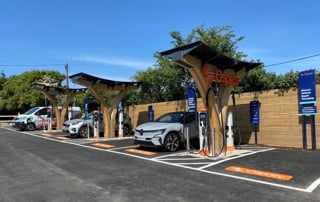The Government has announced a review of transport laws in its Future of Mobility Urban Strategy to ensure they can meet changes in the way people and goods will be moved around UK cities.
In what it is describing as the biggest review into transport in a generation, it will explore regulations around new types of vehicles including e-scooters and e-cargo bike trailers.
The Department for Transport (DfT) says it will also explore how sharing data can improve services by reducing congestion, and how journey planning and payments can be simplified.
At the same time, the Government is launching a competition for up to four new ‘future mobility zones’, with funding of £90 million available to test ideas to improve journeys.
Ideas, it says, will tap into widespread smartphone use and will include smoother payment systems, better, more up-to-date travel information and the use of innovative forms of transport, with the aim of making travel in towns and cities more convenient, more reliable and cheaper.
Future of mobility minister, Jesse Norman, said: “We are at a potentially pivotal moment for the future of transport, with revolutionary technologies creating huge opportunities for cleaner, cheaper, safer and more reliable journeys.
“Through this strategy the Government aims to take advantage of these innovations; connecting more people and bringing big benefits we hope for both the economy and the environment.”
The review of transport laws comes after the Government launched consultations on the future of mobility and last mile deliveries, last summer (fleetnews.co.uk, July 30, 2018).
It has published its response to the Last Mile call for evidence and its future of mobility consultation alongside the new strategy, outlining a range of measures to support cleaner and more sustainable last mile deliveries. These include increasing the uptake of e-cargo bikes and e-vans.
In addition, working with the Energy Saving Trust, the Government is also now inviting expressions of interest for £2m of funding to support the uptake of e-cargo bikes.
Mike Hawes, chief executive of the Society of Motor Manufacturers and Traders (SMMT), said: “The automotive industry is responding to perhaps the most significant change since the invention of the car.
“Mobility as we know it is evolving, improving people’s day-to-day lives with implications for all of society.
“Today’s strategy offers important guidance on the objectives and principles underpinning the future of mobility in towns and cities, while giving industry scope to invest and innovate, developing exciting new services.
“We look forward to working closely with government and local authorities to shape the strategy’s implementation, helping to position the UK as a global leader in future mobility.”
Future of Mobility Grand Challenge Business Champion and former Board Member of BMW, Ian Robertson, said: "With a long history of transport innovation, a world-class research base and many established technology leaders, the UK is in prime position for a transport revolution.
“The Government’s vision as set out in the Future of Mobility Urban Strategy will ensure that going forward, all businesses within the transport industry create technology that is accessible to everyone, environmentally friendly and economically worthwhile.
“In doing so, the industry can ensure it harnesses its domestic expertise to profit from a growing market for cleaner, safer and more efficient transport."
The Future of Mobility Urban Strategy, which can be viewed here, is a key part of the Government’s modern Industrial Strategy. It sets out nine key principles that aim to guide Government decision-making going forward, ensuring that emerging transport technologies are safe, accessible and green. These include being: safe, secure and guarded against cyber threats; accessible to older people and those with visible and non-visible disabilities; and in line with the government’s ambition for a zero-emission future.
RAC head of roads policy Nicholas Lyes said: “Clearly, much needs to be thought through before electric scooters can be allowed to use UK roads legally.
“While improvements in technology are providing many new exciting transport possibilities, the key to gaining public acceptance must surely be demonstrating they can be used safely.
“The convenience and affordability of electric scooters should not be overlooked, but the vulnerability of riders in a collision is arguably even greater than those on bicycles.
“Care needs to be taken to ensure the safety of all road users, including pedestrians and cyclists, as new modes of transport gain popularity.
“We know drivers who regularly have to deal with congestion in urban areas are often open to alternative forms of transport, so any move to review regulations to make this simpler and encourage take-up should be welcomed.
“Ultimately though, the aim of any review of transport laws should be about how to provide safe, reliable, convenient and cost-effective options while also keeping our roads moving for those who still require their vehicles.”
To coincide with the launch of the Government strategy, the British Vehicle Rental and Leasing Association (BVRLA) has published its new Mobility Credits Scrappage Scheme policy paper.
This makes the case for a nationally funded, locally targeted vehicle scrappage scheme that offers a mobility credit in exchange for a household scrapping its older, more polluting vehicle.
The credit, says the BVRLA, can be spent on more sustainable ‘pay-as-you-go’ private and public transport modes, including car and bike hire, car clubs, trams, buses and trains.
As well as reducing emissions, this scheme advances the shift away from private car ownership and increases the availability of road space in crowded urban areas, it says.
A mobility credits scheme can be used in conjunction with new technologies such as integrated Mobility as a Service (MaaS) platforms to incentivise more sustainable journeys involving public, shared and active transport.
The BVRLA and its members are already engaging with local and national policymakers to set out the role they can play in delivering the benefits promised by new mobility technologies and businesses models.
Enterprise Rent-A-Car is currently working with Transport for West Midlands on a Mobility Credits Scrappage Scheme pilot.
“Over recent months, I have been delighted that policymakers see car rental and club as a key part of the mass transit solution in urban areas,” said Ben Lawson, vice president of strategy and mobility at Enterprise Rent-A-Car.
“Mobility Credits represent a real opportunity to change the behaviour of residents and will see a rise in people opting to use a variety of modes to meet their needs.
"Initially credits will help with reducing NOx emissions, but if they are delivered via a MaaS platform then it will ensure Britain has a adopted a pioneering and sustainable approach to transport policy."
To read the Government’s Future of Mobility Urban Strategy, click here.






















Login to comment
Comments
No comments have been made yet.